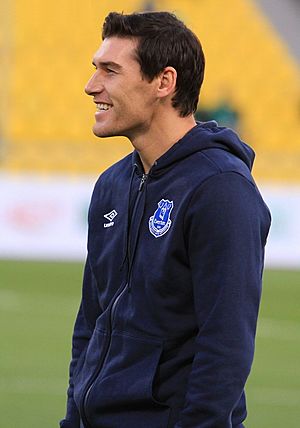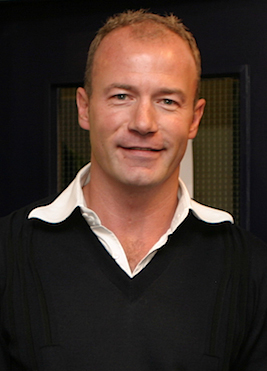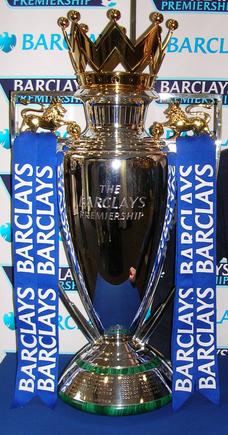Premier League facts for kids
 |
|
| Founded | 20 February 1992 |
|---|---|
| Country | England |
| Confederation | UEFA |
| Number of teams | 20 |
| Level on pyramid | 1 |
| Relegation to | EFL Championship |
| Domestic cup(s) | |
| League cup(s) | EFL Cup |
| International cup(s) | |
| Current champions | Liverpool (2nd title) (2025–26) |
| Most championships | Manchester United (13 titles) |
| Most appearances | Gareth Barry (653) |
| Top goalscorer | Alan Shearer (260) |
| TV partners |
|
The Premier League is the top level of professional association football (soccer) in England. It is the most popular football league in the world. Twenty clubs compete in the league every season, which usually runs from August to May.
Each team plays 38 matches in a season. They play every other team twice: once at their own stadium (home) and once at the opponent's stadium (away). At the end of the season, the team with the most points is crowned the champion. The three teams with the fewest points are relegated (moved down) to the EFL Championship.
The league was started on 20 February 1992. Before this, the top division was called the Football League First Division. The clubs decided to form a new league to earn more money from television broadcasts and improve their stadiums. Since it began, 51 different clubs have played in the Premier League. Seven of them have won the title: Manchester United, Manchester City, Chelsea, Arsenal, Liverpool, Blackburn Rovers, and Leicester City.
Contents
History of the Premier League
Origins and Founding
In the 1980s, English football was having a difficult time. Stadiums were old and crumbling, and there were problems with safety and bad behavior by some fans. English clubs were even banned from playing in European competitions for five years after a serious incident in 1985.
By the early 1990s, things started to improve. England did well in the 1990 FIFA World Cup, and the ban on European games was lifted. The top clubs wanted to turn football into a better business. They wanted to build safer, all-seater stadiums and earn more money to buy the best players.
In 1992, the teams in the First Division decided to break away from the English Football League to form their own league. This was called the FA Premier League. The first season started in August 1992 with 22 teams. Brian Deane of Sheffield United scored the very first goal.
Famous Winning Teams
Manchester United dominated the league in the 1990s and 2000s. Managed by Sir Alex Ferguson, they won 13 titles. They had famous players like David Beckham, Ryan Giggs, and Cristiano Ronaldo.
In the 2003–04 season, Arsenal did something amazing. They won the league without losing a single game! Because of this, the team was nicknamed "The Invincibles".
Later, Chelsea and Manchester City became very strong teams after being bought by wealthy owners. Manchester City set a record by winning four titles in a row between 2021 and 2024. In the 2015–16 season, Leicester City surprised everyone by winning the league, even though most people thought they would be relegated.
How the League Works
The Competition
There are 20 clubs in the Premier League. A season lasts from August to May.
- Matches: Each team plays 38 games.
- Points: A team gets 3 points for a win, 1 point for a draw (tie), and 0 points for a loss.
- Ranking: Teams are ranked by total points. If points are equal, they look at goal difference (goals scored minus goals allowed).
Promotion and Relegation
The Premier League is connected to the EFL Championship, which is the league just below it.
- Relegation: The three teams that finish at the bottom of the Premier League table (18th, 19th, and 20th place) are moved down to the Championship for the next season.
- Promotion: The top two teams from the Championship move up to the Premier League. A third team is promoted after winning a set of playoff matches.
Video Assistant Referee (VAR)
Since the 2019–20 season, the league has used VAR. This is a system where extra referees watch video replays of the game on screens. They help the referee on the pitch make correct decisions about goals, penalties, and red cards.
The Clubs
Current Teams (2025–26)
Twenty clubs are competing in the 2025–26 season. Some of these teams, like Arsenal, Chelsea, Everton, Liverpool, Manchester United, and Tottenham Hotspur, have played in every Premier League season since 1992.
| Club | Stadium | City |
|---|---|---|
| Arsenal | Emirates Stadium | London |
| Aston Villa | Villa Park | Birmingham |
| Bournemouth | Vitality Stadium | Bournemouth |
| Brentford | Gtech Community Stadium | London |
| Brighton & Hove Albion | Amex Stadium | Brighton |
| Burnley | Turf Moor | Burnley |
| Chelsea | Stamford Bridge | London |
| Crystal Palace | Selhurst Park | London |
| Everton | Goodison Park | Liverpool |
| Fulham | Craven Cottage | London |
| Leeds United | Elland Road | Leeds |
| Liverpool | Anfield | Liverpool |
| Manchester City | Etihad Stadium | Manchester |
| Manchester United | Old Trafford | Manchester |
| Newcastle United | St James' Park | Newcastle |
| Nottingham Forest | City Ground | Nottingham |
| Sunderland | Stadium of Light | Sunderland |
| Tottenham Hotspur | Tottenham Hotspur Stadium | London |
| West Ham United | London Stadium | London |
| Wolverhampton Wanderers | Molineux Stadium | Wolverhampton |
Champions
Since 1992, seven different clubs have won the Premier League trophy.
| Club | Titles | Winning Seasons |
|---|---|---|
| Manchester United | 13 | 1993, 1994, 1996, 1997, 1999, 2000, 2001, 2003, 2007, 2008, 2009, 2011, 2013 |
| Manchester City | 8 | 2012, 2014, 2018, 2019, 2021, 2022, 2023, 2024 |
| Chelsea | 5 | 2005, 2006, 2010, 2015, 2017 |
| Arsenal | 3 | 1998, 2002, 2004 |
| Liverpool | 2 | 2020, 2025 |
| Blackburn Rovers | 1 | 1995 |
| Leicester City | 1 | 2016 |
Players and Managers
Famous Players

Many of the world's best footballers play in the Premier League.
- Most Appearances: Gareth Barry holds the record for playing in the most matches (653).
- Most Goals: Alan Shearer scored the most goals in Premier League history (260).
- Most Clean Sheets: Goalkeeper Petr Čech kept the most "clean sheets" (matches where he did not let in any goals), with 202.
Players from all over the world come to England to play. In the first season, only 11 players in the starting lineups were from outside the UK and Ireland. Today, there are players from over 100 different countries.
Top Goalscorers

The top scorers in the history of the league are:
- Alan Shearer (260 goals)
- Harry Kane (213 goals)
- Wayne Rooney (208 goals)
- Andy Cole (187 goals)
- Sergio Agüero (184 goals)
Managers
The manager is the person in charge of the team. They choose the players, run training sessions, and decide the tactics for each game.
- Sir Alex Ferguson managed Manchester United for 21 Premier League seasons and won 13 titles.
- Arsène Wenger managed Arsenal for 22 years, the longest time any manager has stayed at one Premier League club.
- Pep Guardiola has won many titles with Manchester City, including four in a row.
Trophies and Awards
The Trophy
The Premier League trophy is made of solid silver and silver gilt. It has a golden crown on top. The base is made of a green stone called malachite, which represents the green grass of the football pitch.
The design features lions, which are a symbol of English football. There are two lions on the handles, and when the captain of the winning team lifts the trophy, he becomes the "third lion."
Season Awards
At the end of every season, special awards are given out:
- Golden Boot: For the player who scores the most goals.
- Golden Glove: For the goalkeeper who keeps the most clean sheets.
- Player of the Season: For the best player.
- Manager of the Season: For the best manager.
Watching the Games
Stadiums
Premier League football is played in large stadiums filled with fans. The largest stadium is Old Trafford, home of Manchester United, which can hold over 74,000 people. The smallest stadiums hold around 11,000 to 17,000 people. All stadiums in the league are "all-seater," meaning everyone must sit down during the game for safety.
On Television
The Premier League is the most-watched sports league in the world. It is broadcast to over 600 million homes in 212 different territories. In the United Kingdom, games are shown on Sky Sports, TNT Sports, and Amazon Prime Video. Highlights are shown on the BBC program Match of the Day.
Images for kids
-
Eden Hazard playing for Chelsea against Norwich City.
-
Cristiano Ronaldo taking a free kick for Manchester United.
-
Arsène Wenger was the manager of Arsenal for 22 years.
See also
 In Spanish: Premier League para niños
In Spanish: Premier League para niños
 | Charles R. Drew |
 | Benjamin Banneker |
 | Jane C. Wright |
 | Roger Arliner Young |







